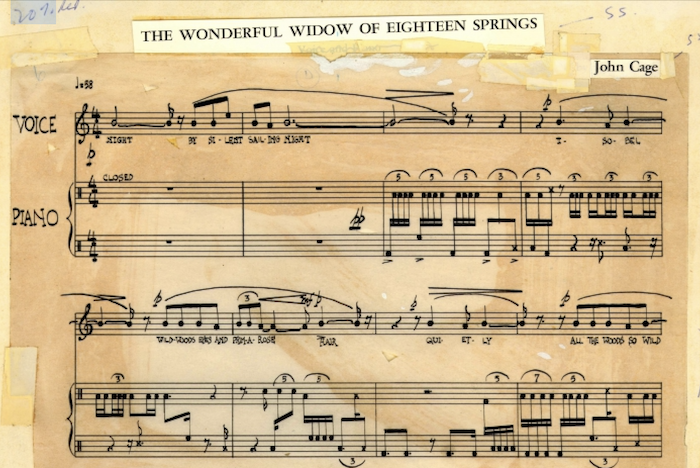
"This essentially rhythmic speech set against a patterned percussive accompaniment cannot be considered a song in the usual sense. Cage, however, is such an innovator that one often loses sight of the fact that if one does not expect conventional sounds, his music is often very well constructed. Here, for example, the composer weaves a hypnotically compelling pattern of rhythmic tension and relaxation, akin to certain non-Western music, which is very appropriate for Joyce's moody prose."
"In 1942, John Cage composed a short piece of music adapted from the text of James Joyce's Finnegans Wake. Titled "The Wonderful Widow of Eighteen Springs," the piece was originally commissioned and performed by amateur soprano and socialite Justine Fairbank, and while we don't have a recording of her performance, we do have Cage's sheet music (see first page above, or view the entire book here). It is-as one might expect-an unusual piece. It sounds like song, yet isn't."
In 1942 John Cage composed a short work adapting text from James Joyce's Finnegans Wake titled 'The Wonderful Widow of Eighteen Springs.' The piece was commissioned and originally performed by amateur soprano and socialite Justine Fairbank; no recording of her performance survives but Cage's sheet music exists. The composition uses rhythmic speech with a patterned percussive accompaniment and functions outside conventional song forms, weaving hypnotic patterns of rhythmic tension and relaxation akin to certain non-Western musics. Singer instructions specify no vibrato and allow transposition for a low, comfortable range. The flexible scoring enables diverse interpreters, including a notable later rendition by Joey Ramone.
Read at Open Culture
Unable to calculate read time
Collection
[
|
...
]